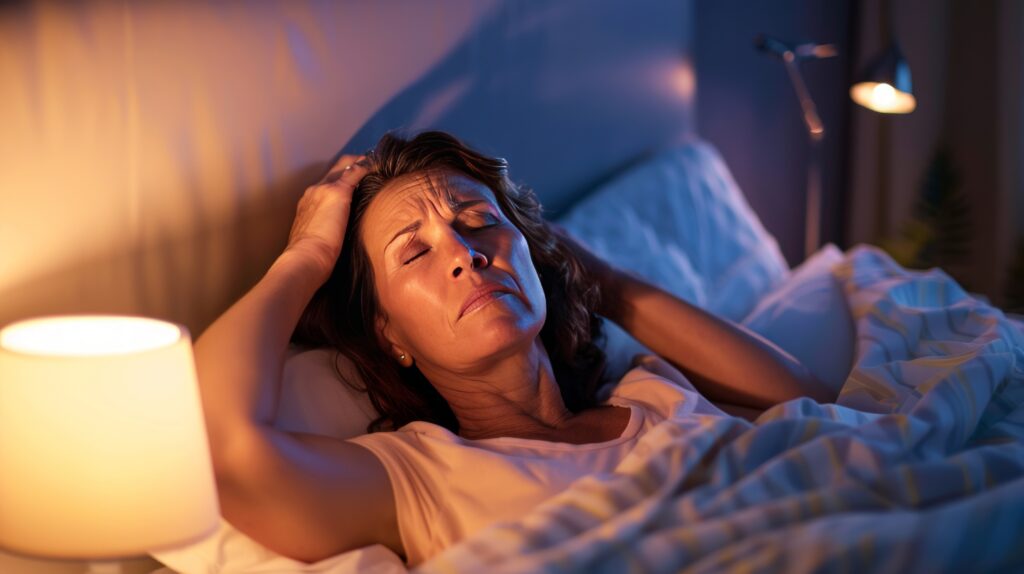Sleep, Women's Health
Hormone Imbalance: Is Menopause Preventing You From Deep Sleep?
Hormone imbalance, particularly during menopause, can significantly impact your sleep quality. Many women going through this stage of life experience disruptions in their ability to fall asleep and stay asleep, leading to frustration and fatigue. Hormones like estrogen and progesterone play critical roles in regulating sleep, and as they fluctuate during menopause, the body’s natural sleep patterns can be thrown off balance. In this article, we’ll explore how hormone imbalance during menopause may be preventing you from getting deep, restorative sleep, and how you can support your body’s natural rhythms to improve your rest.

Understanding the Role of Hormones in Sleep
Hormones are powerful chemical messengers that regulate numerous functions in your body, including sleep. During menopause, the production of key hormones, such as estrogen and progesterone, starts to decline. Estrogen has a direct effect on the production of serotonin, a neurotransmitter that helps regulate mood and sleep cycles. Lower levels of estrogen can lead to difficulty falling asleep and staying asleep, contributing to disturbances like hot flashes and night sweats, which can further interrupt sleep.
Progesterone, often referred to as the “sleepy hormone,” also plays a role in promoting relaxation and supporting deep sleep. As progesterone levels drop during menopause, many women report feeling more restless at night or waking up frequently throughout the night.
Hormone Imbalance and Sleep Disruptions
A hormone imbalance during menopause can cause a range of sleep-related issues. Hot flashes and night sweats are common symptoms of a shift in hormone levels, and they often occur at night, disturbing the body’s natural cooling mechanisms and making it harder to sleep soundly. Additionally, changes in hormone levels can increase feelings of anxiety and stress, further preventing relaxation and deep sleep.
Diet and Nutrition to Support Sleep
A balanced diet plays a crucial role in managing hormone imbalance and promoting healthy sleep. Consuming nutrient-dense foods that support hormone balance can make a significant difference in your ability to sleep well.
- Magnesium-rich foods: Magnesium helps regulate the nervous system and can promote relaxation. Foods like leafy greens, nuts, seeds, and avocados are great sources.
- Healthy fats: Omega-3 fatty acids found in fish, walnuts, and flaxseeds are vital for hormone production and can help reduce inflammation in the body that may be contributing to sleep disturbances.
- Protein: Protein helps stabilize blood sugar levels, preventing spikes and crashes that may interfere with sleep. Including lean proteins like chicken, tofu, or legumes in your meals can help maintain a stable energy level throughout the night.
- Avoiding caffeine and sugar: Both caffeine and sugar can interfere with your body’s ability to fall asleep, particularly when consumed in the late afternoon or evening. Opt for herbal teas like chamomile, which may have a calming effect.
Lifestyle Adjustments to Encourage Restful Sleep
In addition to maintaining a nutritious diet, adopting a healthy lifestyle can support better sleep during menopause. Making a few changes to your daily habits can help regulate your hormones and encourage relaxation:
- Consistent sleep schedule: Going to bed and waking up at the same time every day can help retrain your body’s internal clock and improve your sleep quality.
- Regular exercise: Engaging in moderate physical activity during the day, such as walking or yoga, can improve circulation, reduce stress, and encourage deeper, more restful sleep. However, try to avoid intense exercise close to bedtime as it could interfere with sleep.
- Stress management: Hormonal fluctuations can lead to increased feelings of stress and anxiety. Meditation, deep breathing exercises, or gentle stretching before bed can help calm the mind and prepare your body for rest.
Supplements to Support Sleep
While supplements should always be approached with caution, there are several that may provide gentle support for sleep without relying on prescription medications. Talk to your healthcare provider before adding any new supplements to your routine.
- Magnesium supplements can help relax muscles and promote better sleep, especially if you’re not getting enough magnesium from your diet.*
- Adaptogenic herbs: Herbs like ashwagandha and passion flower are known for their calming properties and can help reduce stress, making it easier to fall asleep.*
- Vitamin D: A deficiency in vitamin D can contribute to sleep disturbances. If you’re not getting enough sunlight or dietary sources of vitamin D, consider discussing supplementation with your doctor.*
Creating a Sleep-Friendly Environment
Finally, your sleep environment can also influence your rest. Consider these tips to make your bedroom a sanctuary for sleep:
- Cool room temperature: A cool environment can help regulate your body temperature and prevent hot flashes from disturbing your sleep. Aim for a temperature between 60-67°F (15-20°C) for optimal rest.
- Limit screen time: The blue light emitted from screens can interfere with your body’s natural production of melatonin, a hormone that regulates sleep. Try to turn off electronics at least an hour before bed.
- Relaxing bedtime routine: Create a calming ritual before bed, such as reading a book, listening to soothing music, or practicing relaxation techniques, to signal to your body that it’s time to wind down.
Overview
Hormone imbalance during menopause is a common cause of sleep disruptions, but there are numerous ways to support your body and encourage better sleep. A combination of healthy eating, lifestyle changes, and natural supplements can help you manage hormonal fluctuations and create a peaceful, restorative sleep routine. By listening to your body and taking a holistic approach to sleep, you can overcome hormone imbalance and enjoy deeper, more restful sleep during menopause.
Sources:
Like? Share with Your Friends!

